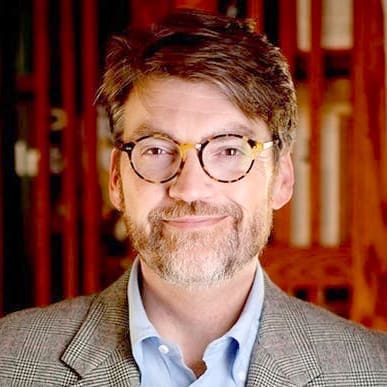Surely the most naive of Sumerian writers must have understood that cuneiform was a doomed writing system anyway, and that anybody still pressing wedges into soft clay was a fool. It must have made for a sour panel at the Euphrates Writers Conference when the participants showed up for ‘The Death of Clay Tablets.’ Technological advances were threatening the writing arts, with clay itself soon to be replaced by papyrus and then paper and then satellite dishes for high-definition television. How would the written word survive?
—Robert Clark Young in “The Death of the Death of the Author” (The Southern Review, Winter 2008)
I went to the same graduate school as Robert Clark Young, though our terms didn’t quite overlap, and after reading his piece in The Southern Review, I ended up in touch with him. We spent an afternoon in San Francisco chatting about all things book-related, after which I very nearly got him run over—but that’s another story. Since I’m prone to cynicism (in the same essay, Young quotes Sidney J. Harris to the tune that a cynic “is prematurely disappointed in the future”), I’ve kept his essay handy as a vade mecum, invoking the sentiment wherever applicable, sometimes to my detriment.
When Ken Myers interviewed me for Mars Hill Audio Volume 90, for example, he kept asking about the decline of literacy, only to have me scoff at the pessimism. Little did I know that the flipside of Volume 90 would feature an extended chat with Dana Gioia about the NEA’s depressing literacy study. Fortunately that part of my interview was excised from the final version, sparing me the indignity of appearing unsuitably optimistic and glib. Ever since, I’ve kept what little optimism I possess to myself.
The Euphrates Writers Conference and the biennial Calvin Festival of Faith and Writing would seem to have little in common, but the most recent festival featured a panel called “The Case for Printed Books.” Five minutes into the proceedings, I had to double-check my program to make sure it wasn’t titled “The Wake for Printed Books.” The book was doomed and anyone still pressing ink onto paper (albeit metaphorically in our digital age) was a fool. The only difference? The gathered assembly consisted of self-professed fools, book lovers determined to rage against the dying of the light. Our friend the Book was terminally ill, practically dead, but we weren’t going to let the ones who did him in get off scot-free.
There were booksellers forced to close up shop, printers retrenching in the face of lowered demand, even all-powerful editors forced to justify their very existence. I’m now accustomed to the lament of independent booksellers. Once a Meg Ryan movie is made about the dilemma, it’s safe to say the concern has gone mainstream. But to see editors stumbling over their words, making a defensive case for their continued relevance in a world of e-books where a generation of authors have been told they have to market themselves or not be marketed at all . . . that was new. Publishers have gone from sneering at self-publishing to getting in on the act. Strange new world. Even the publishers’ role as “risk aggregators” (to borrow OK Go singer Damian Kulash’s term for the record labels) might not guarantee them a bright future.
Naturally the iPad came up. Some panelists seemed delighted by the device and how it might change our perception of what a book is. Most were wary. A fun toy, yes, but with the potential to destroy the world as we know it. The Espresso Book Machine, which cranks out a printed book on demand, met with more enthusiasm, perhaps because it seems to reverse the trend of disembodiment: instead of turning hard copies into ether, it pulls forgotten books from the ether and turns them back into hard copies. [Ed: watch Cardus publications being produced on a local Espresso machine.]
The End of Civilisation
Speaking of machines, in the 1960 film version of The Time Machine, Roy Taylor finds himself among the blond-haired Eloi. The time-traveling representative of the Scottish Enlightenment is at first delighted by the leisure society, assuming that freedom from toil must translate into full-time study and experimentation. He fires off one question after another, but the Eloi remain indifferent until he mentions books. They have books, they tell him, much to his relief. The books will answer his questions, he says. They’ll tell him everything he needs to know.
His blond-haired, blue-eyed guide conducts him to the shelves, where a screening curtain promptly falls at the touch. Opening a dusty volume, the time traveler smiles. Then he turns a page and it crumbles in his hand. More pages dissolve.
“Yes,” he says, “they do tell me all about you.”
He sweeps his hand through a row of shelved books, creating a cloud of dust.
Until now, the End of the Book has been a symbol of the End of Civilization. The anaesthetized drones of the leisure society have no time to read. More to the point, they have no interest in the process. They are too busy being entertained.
When I returned from the Calvin Festival, one of the friends I’d re-connected with there forwarded a link from Richard Mouw’s piece in April’s Books & Culture, a reassessment of “Calvinist suspicion of fiction and poetry,” specifically eighteenth century Scottish Presbyterian skepticism:
The reasons for this widespread suspicion of novels and poems were different than I would have guessed, though. The concerns were due . . . not so much to “ignorance or philistinism” as to a “stridently Calvinist view of labor.” For one thing, folks worried that imaginative writing was the kind of thing that drew on “solitude and isolation” rather than social engagement—they were thinking here of the British Romanticists. The kind of person who spent considerable time imagining and constructing fictional and poetic scenarios was like to be someone who disdained the ordinary rhythms of work and sociability, thus fostering a sense of self-importance and a pattern of excessive introspection.
It might seem that the Eloi have little in common with eighteenth century readers of fiction—books are certainly not the cause of their self-absorption, and they don’t lack for a sense of community—but the time traveler’s problem with their society sounds very similar to the Presbyterian’s problem with novel readers: they lack work. The only thing that’s changed is that by the late nineteenth century, literature can be seen as a kind of work: the work of civilization.
Ironically, I read Mouw’s piece via my iPhone while attending a presbytery meeting. During the examination of a new minister, a question from the floor asked what “non-theological” reading he’d recently undertaken. The answer was Dostoevsky’s The Brothers Karamazov, and it was given without any self-consciousness. None of the Presbyterian elders in attendance expressed concern at the amount of leisure and “excessive introspection” the completion of a Russian novel requires. At least one of them, the iPhone-wielding novelist, was in no position to throw stones.
The critique Mouw cites of fiction hasn’t exactly gone away over time. Only the target has shifted. Reading novels is a virtuous activity, assuming they’re the right kind of novels. Today’s bogeyman is social networking. Blogging and Facebook and Twitter, virtual substitutes for embodied social engagement. Substitute a few terms and the diatribes could be republished today. As e-books, no doubt.
Is the Book the Body or the Soul?
What’s at stake in the End of Books? The sense of embodiment. Obviously the content will survive. The question is, in what form?
Book is a shifty word, denoting both the physical object and the content within. As an author, I think of myself as having “written books,” when in fact I’ve typed hundreds of pages of fiction and nonfiction into various word processing files, e-mailed them to my editors, and only much later seen them take physical form. To say all that, however, seems pedantic. To describe myself as, say, a “content provider,” however fitting the term might seem, strikes me as something akin to insult. I write books.
And I’m a lover of books, too, unaccustomed to making a body/soul distinction where the printed word is concerned. The book is the object and its contents, inseparable in my mind. I dwell in a house lined with shelves, most of them bowed by the weight of their printed content. Beautiful books and ugly ones. Read and unread. Objects of comfort, outrage, derision, admiration. Some pristine and others scarred. Some bound in leather, some in paper (at least one in shagreen). Prized and cheap side by side. Tangible things, each with a history. I can tell you where they came from, where they’ve been. The ones I sought out and the ones I discovered unexpectedly. The ones kept under glass in dark bookstores and, all too often, the ones overnighted from the clean, well-lit warehouses of Amazon. All of that will disappear when the book’s body does.
Perhaps nothing can stop the change. Perhaps nothing should. As at the wake for the dead friend, that’s not the point. Sure, he was sick. Sure, we all saw it coming. In a way, we’re even relieved that his suffering is finally over. But don’t expect us not to miss him. And don’t expect us not to pity you for never having the chance to know him. Those of us who did will never forget.


